
DME Publications
When an individual has high learning potential alongside another condition (or conditions) which can hinder their learning (special educational need or disability – SEND) they are described as having Dual or Multiple Exceptionality (DME). In the USA they use the term twice-exceptional (2e). Below are a selection of publications which help to understand how DME can impact a child’s life and offer information on how to support children with DME.
Publications: Dual or Multiple Exceptionality – General
Parent
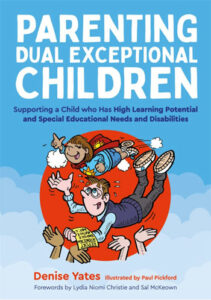
Parenting Dual Exceptional Children
Denise Yates
Published 2022 (Jessica Kingsley Publishers)
This book is a comprehensive, practical guide to Dual or Multiple Exceptionality (DME). It offers a strengths-based approach towards helping parents to recognise and focus on their child’s areas of potential, support them towards better attainment and self-esteem and to build on their abilities whilst also identifying and addressing areas of difficulty. It provides an understanding of the mixed learning profile of children with DME, as well as guidance for parents on working positively with schools and providing their child with the support they need.
Publications: Education
School
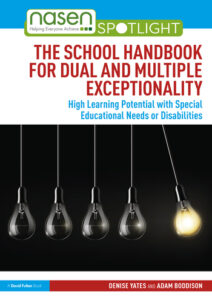
The School Handbook for Dual and Multiple Exceptionality: High Learning Potential with Special Educational Needs or Disabilities
Denise Yates and Adam Boddison
Published 2020 (Routledge)
The School Handbook for Dual and Multiple Exceptionality (DME) offers a range of practical strategies to support SENCOs, GATCOs, school leaders and governors in developing effective provision for children that have both High Learning Potential and Special Educational Needs or Disabilities. Building on the principles of child-centred provision and coproduction, it provides useful tips on developing the school workforce to better identify and meet the needs of learners with DME.
School
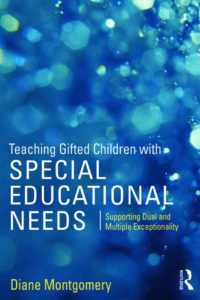
Teaching Gifted Children with Special Educational Needs: Supporting Dual or Multiple Exceptionality
Diane Montgomery
Published 2015 (Routledge)
Children with both giftedness and special educational needs are often found in mainstream classrooms. This essential resource provides an overview of existing knowledge about dual and multiple exceptionality (DME), examining the needs of gifted and talented children from both the class teacher’s and SENCo’s perspectives.
School
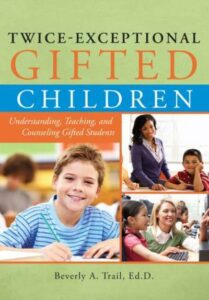
Twice-Exceptional Gifted Children: Understanding, Teaching and Counseling Gifted Students
Beverly A. Trail
Published 2010 (Routledge)
This comprehensive text provides an overview of who these students are, how teachers can tap into their strengths and weaknesses, and what educational strategies should be implemented to help these students succeed in school and beyond. The book will guide a collaborative team step-by-step through the process of identifying students’ needs, selecting modifications and accommodations, and developing a comprehensive plan to meet the diverse needs of twice exceptional children.
Publications: Neurodiversity
Parent
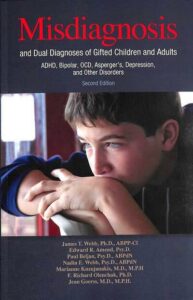
Misdiagnosis and Dual Diagnoses of Gifted Children: ADHD, Bipolar, OCD, Asperger’s, Depression, and Other Disorders
James T. Webb et al
Published 2nd ed., 2016 (Gifted Unlimited, LLC)
This book includes discussions on diagnoses commonly given to gifted children and adults, characteristics of gifted children and adults, traits of diagnoses incorrectly given to gifted children and adults, guidelines to avoid mislabelling gifted children, parent-child relationship problems, issues for gifted adults, and advice for selecting a counsellor or health care professional.
Young Person
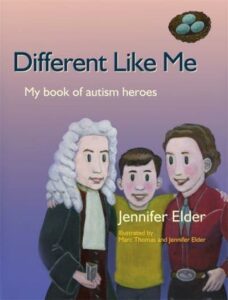
Different Like Me: My Book of Autism Heroes
Jennifer Elder
Published 2005 (Jessica Kingsley Publishers)
Eight-year-old Quinn, a young autistic boy, tells young readers about the achievements and characteristics of his autistic heroes, from Albert Einstein, Dian Fossey and Wassily Kandinsky to Lewis Carroll, Benjamin Banneker and Julia Bowman Robinson, among others. All excel in different fields, but are united by the fact that they often found it difficult to fit in-just like Quinn.
Parent/School
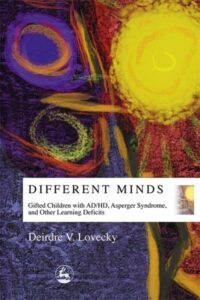
Different Minds: Gifted Children with AD/HD, Asperger Syndrome, and Other Learning Difficulties
Deirdre V. Lovecky
Published 2003 (Jessica Kingsley Publishers)
Recognising the different levels and kinds of giftedness, this book provides an insight into the challenges and benefits specific to gifted children with attention difficulties. Explaining why certain children are gifted and how giftedness is manifested, each chapter on a specific topic addresses the relevance for children with AD/HD, autism and Asperger Syndrome. Lovecky guides parents and professionals through methods of diagnosis and advises on how best to nurture individual needs, positive behaviour and relationships at home and at school.
Parent
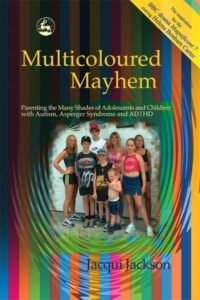
Multicoloured Mayhem: Parenting the Many Shades of Adolescents and Children with Autism, Asperger Syndrome and AD/HD
Jacqui Jackson
Published 2003 (Jessica Kingsley Publishers)
Jacqui Jackson has seven children. Luke (author of Freaks, Geeks and Asperger Syndrome) has Asperger Syndrome, Joe has ADHD, and Ben has autism. Life is anything but straightforward, but the chaos of the Jacksons’ lives is threaded through with humour and common sense. Full of anecdotes and lively thinking, the book explains vividly what it is like to parent young people with such a range of conditions and provides a wealth of helpful and creative advice for other parents and carers.
Young Person
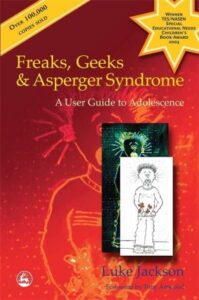
Freaks, Geeks and Asperger Syndrome: A User’s Guide to Adolescence
Luke Jackson
Published 2002 (Jessica Kingsley Publishers)
Have you ever been called a freak or a geek? Have you ever felt like one? Luke Jackson is 13 years old and has Asperger Syndrome. Over the years Luke has learned to laugh at such names but there are other aspects of life which are more difficult. Adolescence and the teenage years are a minefield of emotions, transitions and decisions and when a child has Asperger Syndrome, the result is often explosive. Luke has three sisters and one brother in various stages of their adolescent and teenage years but he is acutely aware of just how different he is and how little information is available for adolescents like himself.
Parent
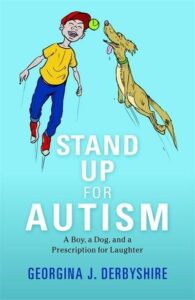
Stand Up for Autism: A Boy, a Dog and a Prescription for Laughter
Georgina J. Derbyshire
Published 2010 (Jessica Kingsley Publishers)
When we tell someone that our child is autistic, the most common response is a sad face and an apologetic look. I hate it when people say ‘I’m sorry to hear that’. Parenting a child on the autistic spectrum can be tough at the best of times, but few books take the time to celebrate the love and laughter an autistic child can elicit in their parents and those around them. In this warm, honest and laugh-out-loud tale of bringing up Bobby, now ten, Georgina Derbyshire shares and rejoices in his ‘slightly different’ childhood.
Parent
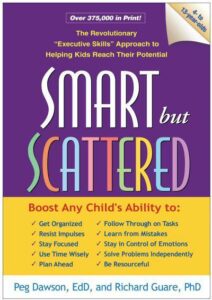
Smart but Scattered: The Revolutionary “Executive Skills” Approach to Helping Kids Reach Their Potential
Peg Dawson and Richard Guare
Published 2008 (Guilford Press)
There’s nothing more frustrating than watching your bright, talented son or daughter struggle with everyday tasks like finishing homework, putting away toys, or following instructions at school. Your “smart but scattered” 4- to 13-year-old might also have trouble coping with disappointment or managing anger. Research into child development shows that many kids who have the brain and heart to succeed, lack or lag behind in crucial “executive skills” – the fundamental habits of mind required for getting organised, staying focused, and controlling impulses and emotions. This book advocates an approach to help.
Young Person
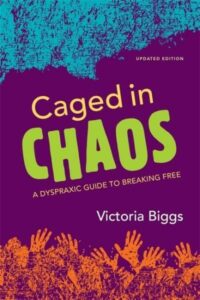
Caged in Chaos: A Dyspraxic Guide to Breaking Free
Victoria Biggs
Published 2nd ed., 2014 (Jessica Kingsley Publishers)
Written by a teenager with dyspraxia, this is a humorous and inspiring practical guide for young adults with dyspraxia and those around them trying to get to grips with the physical, social and psychological chaos caused by developmental co-ordination disorders (DCDs). In her own conversational style, Victoria Biggs explains the primary effects of dyspraxia – disorganisation, clumsiness and poor short-term memory – as well as other difficulties that dyspraxic teenagers encounter, such as bullying and low self-esteem.
Parent
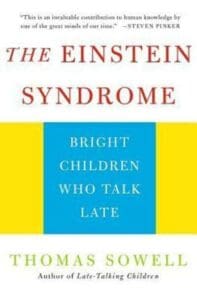
The Einstein Syndrome: Bright Children Who Talk Late
Thomas Sowell
Published 2002 (Basic Books)
The Einstein Syndrome is a follow-up to “Late-Talking Children”. While many children who talk late suffer from developmental disorders or autism, there is a certain well-defined group who are developmentally normal or even quite bright, yet who may go past their fourth birthday before beginning to talk.
Publications: Social and Emotional
Parent
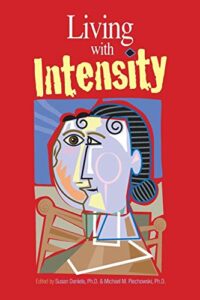
Living with Intensity: Understanding the Sensitivity, Excitability, and Emotional Development of Gifted Children, Adolescents, and Adults
edited by Susan Daniels and Michael M Piechowski
Published 2009 (Gifted Unlimited, LLC)
Gifted children and adults are often misunderstood. Their excitement is viewed as excessive, their high energy as hyperactivity, their persistence as nagging, their imagination as not paying attention, their passion as being disruptive, their strong emotions and sensitivity as immaturity, and their creativity and self-directedness as oppositional. This book describes these overexcitabilities, as well as strategies for dealing with children and adults who experience them.
Young Person
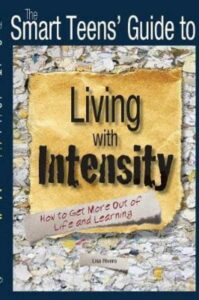
The Smart Teens’ Guide to Living with Intensity: How to Get More Out of Life and Learning
Lisa Rivero
Published 2010 (Gifted Unlimited, LLC)
This book is written for pre-teens and teens who love to learn, although they might not love school. Read about how to understand your intensity, manage perfectionism and self-talk, understand your parents better, and take charge of your education, whether you go to state school, private school, or homeschool. Discover yourself as an intense and excitable learner, a creative learner, and a self-directed learner.
School
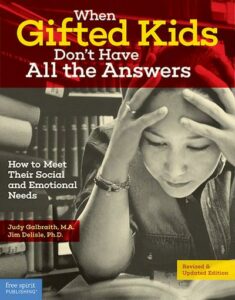
When Gifted Kids Don’t Have All the Answers: How to Meet their Social and Emotional Needs
Judy Galbraith and Jim Delisle
Published 2nd ed. revised, 2015 (Free Spirit Publishing)
The authors present ways to advocate for gifted education; help gifted underachievers, perfectionists, and twice-exceptional students; and provide all gifted kids with a safe, supportive learning environment.
Parent/School
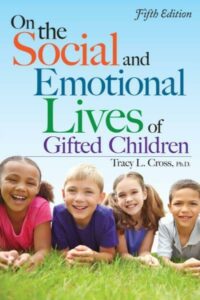
On the Social and Emotional Lives of Gifted Kids: Understanding and Guiding Their Development
Tracy L Cross
Published 5th ed., 2017 (Routledge)
This book tackles important and timely issues dealing with the social and emotional needs of today’s gifted children, including who gifted children are and what giftedness means; how parents, teachers, and other professionals can guide gifted children; the issues facing gifted learners in the 21st century, such as technology and terrorism; and how the education of gifted children can adapt for the future.
.
Young Person
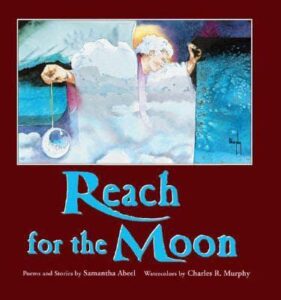
Reach For The Moon
Samantha Abeel
Published 1994 (Pfeifer-Hamilton Pubs)
A beautiful book of poetry and stories by a 13-year-old with dyscalculia reflecting her feelings and experiences.
Young Person
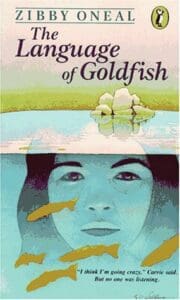
The Language of Goldfish
Zibby O’Neal
Published 1989 (Viking Press)
A novel about a 13-year-old girl struggling with anxiety and on the verge of a mental breakdown. Suitable for ages 12 years and up.
National Association for Special Educational Needs (nasen)
nasen House
4/5 Amber Business Village
Amber Close
Amington
Tamworth
Staffordshire
B77 4RP
Tel: 01827 311500
Email: welcome@nasen.org.uk
Potential Plus UK
The Open University
Vaughan Harley Building Ground Floor
Walton Hall
Milton Keynes
MK7 6AA
Tel: 01908 646433

